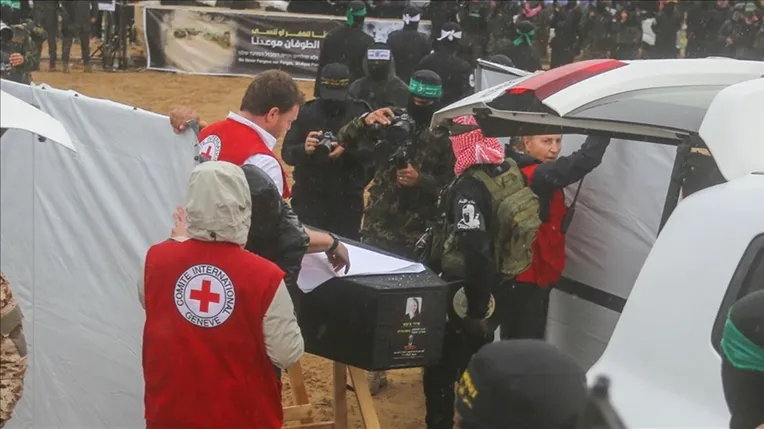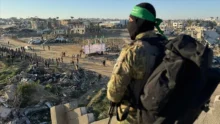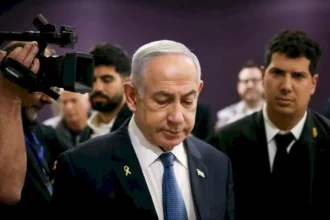From de-escalation to escalation: How have families of Israeli hostages changed their stance?
شبكة الخامسة للأنباء - غزة

In a contradictory stance that aligns them with the hardline Israeli right that has consistently called for stepped-up military action in Gaza, families of the hostages have demanded that Benjamin Netanyahu’s government suspend implementation of the ceasefire agreement, citing the need to recover the remains of hostages — a task that still requires time, effort and scarce resources in the devastated territory.
The families said in a statement they demand the Israeli government “immediately stop implementing the next phases of the agreement as long as Hamas continues not to return all the bodies,” they claimed.
Since Monday, Hamas has released 20 living Israeli hostages and handed over the bodies of 10 out of 28, saying it needs special equipment to search for and extract the remaining 18 bodies.
Meanwhile, Tel Aviv says one of the 10 bodies it received does not match any of the hostages reported from the Strip.
In exchange, Israel released 250 Palestinian prisoners serving life sentences and 1,718 others arrested from the Gaza Strip since 8 October 2023. More than 10,000 Palestinians remain in its prisons.
The families alleged that “Hamas still holds the (bodies of) 19 abductees,” claiming the movement is “violating the agreement.”
“Therefore, there is no room for any unilateral progress by Israel, and any political or security step that does not guarantee their immediate return is an abandonment of Israeli citizens,” the families said.
The families stressed that “the responsibility for recovering all the abductees, alive or dead, rests primarily with the Israeli government.”
They warned that “any step that eases pressure on Hamas or allows the agreement to continue without the return of the abductees would constitute a serious moral and leadership failure.”
Challenges of the remains issue
Contrary to Israeli claims, the al-Qassam Brigades, the armed wing of Hamas, said on Wednesday that it is making a major effort to close the file on the remaining bodies.
It said it needs specialized equipment and techniques to search under the rubble and recover what remains of the Israeli hostages’ bodies.
Unlike Hamas, the new position of the Israeli hostages’ families contrasts with the stance of U.S. President Donald Trump on the issue of the missing bodies.
On Wednesday, Trump said Hamas is certainly looking for the remaining bodies of Israeli hostages in the Gaza Strip, that some are buried a long time ago and some are under rubble, and that the matter “will proceed well.”
On the same day, Israeli officials said negotiations on implementing the second phase of the ceasefire agreement between Israel and Hamas had not yet begun, despite Trump’s statement on Tuesday that they had.
Channel “Israel 24” quoted unnamed Israeli officials as saying: “Contrary to reports, negotiations on the second phase have not yet begun, and will not begin until the first phase is completed with the return of all the hostages’ bodies.”
The agreement between Hamas and Israel is based on a plan put forward by the U.S. president, whose country has backed Israel’s campaign in the Gaza Strip since 8 October 2023.
During that campaign, Israel has killed 67,938 Palestinians and wounded 170,169 others, most of them children and women, and has caused a famine that claimed the lives of 463 Palestinians, including 157 children, the statement said.
Demands of the extreme right
The families’ call to halt implementation of the Gaza ceasefire on the grounds that not all the bodies have been returned places them, for the first time since the onset of the campaign on 8 October 2023, in the camp of Israel’s extreme right.
Since the current Gaza agreement was approved, leading figures of the extreme right such as National Security Minister Itamar Ben-Gvir and Finance Minister Bezalel Smotrich have continued to incite against the deal, calling for the war to continue.
Ben-Gvir accused Hamas on Tuesday evening on his X account of delaying the return of the remaining bodies.
He added that the movement “is still alive and remains, and the mission to destroy it has not been accomplished yet, and must be accomplished as soon as possible as part of the war’s objectives.”
Smotrich wrote on the same platform: “Only military pressure brings back the abductees,” indicating his rejection of a ceasefire under the U.S. plan.
Hamas or Netanyahu?
Throughout the two years of the campaign, the families of the Israeli hostages have accused Netanyahu of abandoning their children in Gaza by insisting on obstructing all of Hamas’s efforts and continuing the war, even accusing him of exposing their living relatives to death and consigning the dead to disappearance.
On 21 August, the families said Hamas had accepted an exchange and ceasefire agreement but that Netanyahu’s office “is working to sabotage it, which would condemn the living abductees to death and the dead to disappearance.”
In a statement on 13 September, the families responded to a post by Netanyahu accusing “Hamas leaders in Qatar of obstructing all attempts at a ceasefire to prolong the war indefinitely.”
The statement said Netanyahu had offered a new reason “for not returning the abductees,” namely that “Hamas leaders in Qatar are blocking any agreement,” asserting that “it has been conclusively proven that there is a single obstacle to the return of the 48 abductees and to ending the war — Netanyahu.”
Shortly before the most recent agreement began to be implemented on 4 October, the families said in a statement that “while the living abductees face the risk of death, and the dead may disappear forever on Gaza’s soil, Netanyahu chose to expand the scope of the fighting and scuttle the agreement to bring them back.”
Previous agreement
Calls to suspend implementation of the Gaza agreement on the pretext that not all the bodies have been returned contradict the agreement document approved by the Israeli government, which acknowledged the difficulties surrounding the remains file.
The official Israeli broadcaster previously published the content of the agreement document, which said Hamas must hand over all information it has about the Israeli dead to a joint mechanism to be established with the participation of Qatar, Egypt, Turkey and the International Committee of the Red Cross.
At the time, the broadcaster quoted informed sources as saying that the location of some Israeli bodies is still unknown and that the search operation will be managed through a joint Israeli-Palestinian-Egyptian-Qatari-Turkish mechanism.






